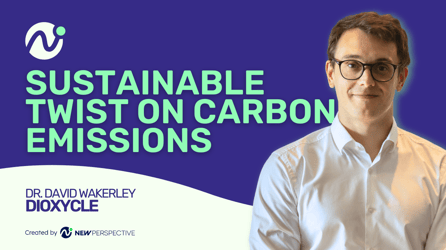Episode Info
Decarbonizing natural gas is essential to reduce greenhouse gas emissions and combat climate change. It's a tough challenge, especially when it comes to separating hydrogen from carbon in methane. Methane's stable molecular structure makes this separation process complex and technically demanding.
In this episode, we speak with Patrick Hanks, Senior Vice President of Technology at C-Zero. They are developing an innovative and scalable solution to decarbonize natural gas with minimal electricity use.
🎥 Guest: Patrick Hanks, Senior Vice President of Technology at C-Zero
🔗 Web: www.czero.energy
📝 Full episode transcript
Dunya Jovanovic: To start off, can you tell us a bit about yourself, your role at C-Zero, and introduce us to the company?
Patrick Hanks: C-Zero, a company where I work as the Senior Vice President of Technology, is focused on decarbonizing natural gas. We aim to separate hydrogen from carbon in methane (the main component of natural gas), which is challenging due to its stability. Our goal is to develop an efficient, scalable method to produce hydrogen and a solid carbon product with minimal electricity usage.
DJ: How has the company evolved since it started?
PH: We initially used molten salt and molten metal technology but pivoted to a new process due to scalability challenges. We're currently piloting this new process in Texas, aiming to produce a ton of carbon and several hundred kilograms of hydrogen daily. We hope our technology will be scalable and ready for industry by the end of the decade.
DJ: How do you position yourself in the competitive landscape of hydrogen production and carbon capture?
PH: I’ve worked on various technologies in this space and believe in an "all of the above" approach. Each technology has its place. For instance, blue hydrogen might be the solution on the US Gulf Coast, but in regions with excellent natural gas infrastructure and limited CO2 sequestration options, C-Zero can play a crucial role. We aim to utilize existing infrastructure and offer alternatives for areas without suitable geology or regulatory environments for CO2 storage.
DJ: How do you differentiate from other companies in terms of branding and identity?
PH: Many companies in this space focus on the carbon byproduct of their process. We, however, are a hydrogen-first company. Our branding emphasizes our commitment to the hydrogen economy, and we target large industrial applications rather than small-scale solutions.
DJ: What challenges have you faced, and how did you overcome them?
PH: Regulatory challenges are significant, as building chemical processes involves multi-year cycles and substantial investments. Stakeholder engagement is critical, and regulatory uncertainty remains a challenge for many in cleantech. Fortunately, our unique process qualifies for 45Q credits, differentiating us from other methane pyrolysis technologies. Another challenge is the early stage of the clean economy transition. While some companies are leading the way, many are waiting to see how initial projects fare. We engage with various sectors—oil and gas, refining, steel production, and power generation—to ensure we're prepared when the market demand increases.
DJ: What advice would you give other companies facing similar challenges?
PH: Developing new technology is difficult, and companies must pivot when necessary. Maintaining dialogue with investors, the board, and potential clients is crucial. Ensuring your technology meets market needs can significantly improve your business plan and marketing. Persistence and networking are key—attend conferences, participate in podcasts, and leverage your consulting network. People want the energy transition to succeed, and collaboration among companies can help us all progress. Each success makes it easier for the next.
DJ: What's next for C-Zero in the coming months? Any big announcements?
PH: We'll have our Texas pilot plant operational, producing up to a few hundred kilograms of hydrogen and a ton of carbon daily. We have several customers lined up to test our carbon for their applications. This pilot will help us refine our process and design the first commercial-scale unit.
DJ: How do you see your technology impacting the industry?
PH: Our technology is designed to address specific challenges facing the hydrogen industry, like limited renewable resources or CO2 sequestration opportunities. We offer a practical solution with clean, low-cost hydrogen and our solid carbon product. This approach can help industries transition to cleaner energy more easily by using existing infrastructure. We see ourselves impacting the industry by providing viable alternatives for methane pyrolysis. Our solid carbon product is non-hazardous and easy to transport, making it an attractive option for many companies.
DJ: How important are partnerships in your journey?
PH: Partnerships are crucial. We've collaborated with major utilities for carbon sequestration and have strong engineering partners for feasibility studies and scaling our technology. Our fluidized bed technology relies on consortium expertise, highlighting the importance of leveraging key skills from other organizations.
DJ: Where would you like to build your next construction sites?
PH: We're in discussions with several potential sites along the US Gulf Coast and have interest from Asia-Pacific regions like South Korea and Japan, where CO2 sequestration options are limited. We're also exploring opportunities in Canada. Our commercial deployment will depend on market demand as well as regulatory and corporate incentives.🎧 Subscribe to our podcast
- Spotify: https://bit.ly/3PSWIyI
- Apple Podcasts: https://bit.ly/3RvlHte
- YouTube: https://bit.ly/3RDzkXg
- Deezer: https://bit.ly/3PvQaof
- Amazon Music: https://bit.ly/3PQlijS
💬 Follow GNP on Social
Host & Co-Producer: Dunja Jovanovic
Executive Producer: Marko Bodiroza
Creator: Nathan Harris




